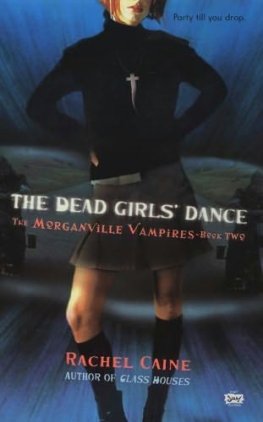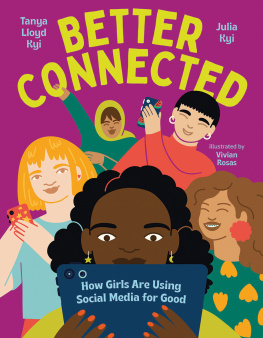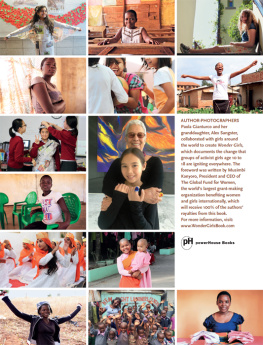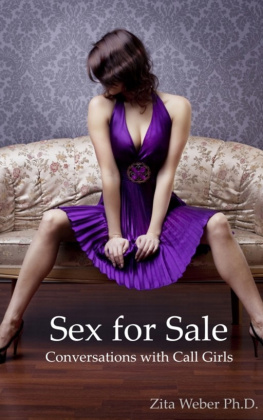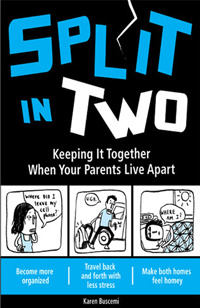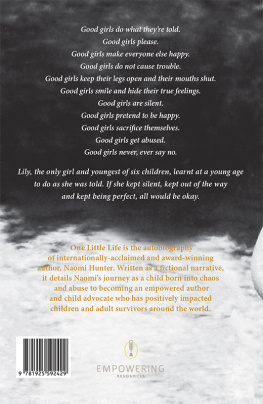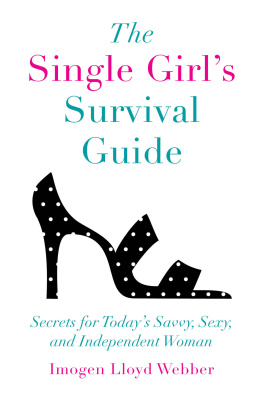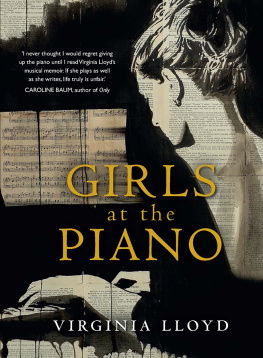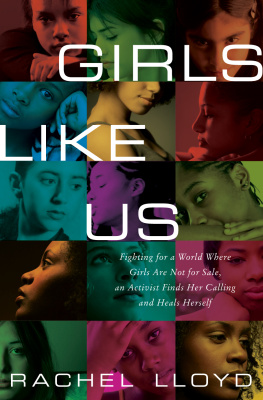RACHEL LLOYD
GIRLS
LIKE
US
Fighting for a World Where
Girls Are Not for Sale,
an Activist Finds Her Calling
and Heals Herself

For Falicia and Adam. I miss you both.
To all the GEMS girls and young women,
past and present, who all hold a place in my heart.
I love you more than you will ever know.
And to all the girls like us.
Hang on to the world as it spins around.
Just dont let the spin get you down.
Things are moving fast.
Hold on tight and you will last.
Keep your self-respect, your manly pride.
Get yourself in gear.
Keep your stride.
Never mind your fears.
Brighter days will soon be here.
Take it from me, someday well all be free.
Keep on walking tall, hold your head up high.
Lay your dreams right up to the sky.
Sing your greatest song.
And youll keep going, going on.
Just wait and see, someday well all be free.
Take it from me, someday well all be free.
DONNY HATHAWAY AND EDWARD HOWARD ,Someday Well All Be Free
Contents
She likes swimming, SpongeBob, Mexican food, writing poetry, getting her nails painted (light pink is her favorite color), and Harry Potter books (plus she thinks Daniel Radcliffe is fine). This Christmas, she really wants an iPod but would settle for some sweat suits, preferably pink. Sometimes shes petulantpouting and sullenbut mostly shes open and eager to be loved. When she smiles, huge dimples crease her chubby face and are still capable, as she moves into awkward adolescence, of melting hearts. Shes much like any other eleven-year-old girl in America, except for one critical difference. Over the last year of her life, shes been trafficked up and down the East Coast by a twenty-nine-year-old pimp and sold nightly on Craigslist to adult men who ignore her dimples and her baby fat and purchase her for sex.
Its late on a Friday night and Im still in the office. As the executive director of Girls Educational and Mentoring Services (GEMS)the organization I founded to help girls and young women who have been recruited and trafficked into the commercial sex industryI have a lot of late nights at the office. During the day, the office functions as a drop-in center, filled with teenage girls who are meeting with their case managers, coming for poetry or cooking or a boxing group, using the computers, or simply hanging out on our old and overused couch. Its frequently noisy; someone always needs something and while I love the energy of the space that weve created, it can be tough to get much paperwork done in this environment. After-hours, when all the girls and staff have left, is often my time to finish writing that grant thats overdue or respond to the never-ending stream of e-mails that I can never seem to stay on top of. Tonight, though, I have no plans to be here till the wee hours; Ive promised myself that Im leaving in ten minutes. The Soup is on and I have a new InStyle magazine to read. After a long day and a long week, its a perfect Friday night plan.
When the office phone starts ringing, Im almost tempted to ignore it and run out the door, but instead find myself answering and agreeing to a request to come to a foster care agency to meet a fourteen-year-old whos just been picked up off the streets. Since were the only nonprofit in New York State designed to serve commercially sexually exploited girls, calls like these are common. Tonight the on-call staff is already at home in Brooklyn, so I figure its easier and quicker for me to just grab a cab downtown, do a quick assessment, try to make the girl feel safe and comfortable, and then transfer the case on Monday to one of my staff members. I figure I can still make it home in time for The Soups 1 a.m. rerun and my weekly date with Joel McHale.
Ten minutes after arriving at the agency, though, Im grouchy and wishing I actually had let the phone ring; the security guard gives me a hard time about getting into the building and the two staff workers on duty act as if Im invisible. Im deposited on a bench in the hallway by another staff person who then disappears for almost an hour, time well spent writing furious e-mails in my head to the agencys supervisor detailing what constitutes an emergency call on a Friday night and what doesnt.
Im struck as always by the sterile, clinical atmosphere of the agency. This newly renovated center had been unveiled with much fanfare from the city. In fairness, it stands in stark contrast to the prior building, which had been Dickensian in its disrepair, yet I cant help feeling that theyve really missed the boat with this new facility. Though it is clean, the harsh fluorescent lights and pale green walls, with the long hallways decorated with nothing more than a few child abuse hotline posters, dont really add up to a warm feeling. I couldnt imagine being a child who was brought here (actually, I could and that was worse). If you ended up here, it was likely after repeated abuse or neglect. You would probably just have been removed from your home, a terrifying experience even if you did feel lucky to escape. Now you were in unfamiliar territory, with strangers, in one of the most child unfriendly spaces in the city. I guess this thought had occurred to people other than me, because at least the living areas for the infants and toddlers had a wall mural and some brightly colored plastic furniture. Someone must have figured that the older kids didnt need color or a semblance of warmth, as the only thing that decorated the walls of the girls unit were some pictures ripped out from Essence and Honey magazines. Clearly one of the staff had tried, but the effort is almost comical: a few magazine pictures, curled at the edges, of happy black women and girls, fashionable and beautiful, eating, laughing, celebrating life. I guess that a concerned woman of color who worked there desperately wanted the children of color, the overwhelming majority, who came through the doors to see images that looked like them in vastly different circumstances. Yet the sparseness of the unit in contrast with the staged, golden-lit happiness of the models makes their picture-perfect lives seem all the more unachievable and remote. I decide to once again offer my five decorating cents (warmer, brighter paint; colorful pictures; curtains; lamps; throw pillows) to the director before I leave.
I sit there redecorating in my mind, alternating between frustration (with waiting so bloody long) and sadness (that there even needs to be a place where kids can go when they cant live at home), when finally two staff workers appear flanking a child, I presume the Danielle Ive been told about, who is obviously fresh from a shower. Her wet black hair is swept back into a ponytail framing a very pretty, slightly chubby, but extremely pissed-off-looking face. Id been informed that the clothes Danielle had been wearing when she was brought in were considered inappropriate, so her new attire consists of a plus-size shapeless black pantsuit, the type favored by larger women in their sixties and probably purchased at Walmart or Talbots. The outfit swamps her short frame, her hands hidden in the sleeves, the pants bagged around her ankles, creating a bizarre Aladdin look that is enhanced by an incongruous pair of black open-toed heels. Despite encouragement from the staff to put on socks and slippers, she has vehemently refused to let go of her shoes and clatters down the hallway with the familiar gait of a girl whose feet are killing her.
The staff members introduce me to Danielle as someone who wants to talk to you, which unsurprisingly is met with a completely disinterested look from her, and then leave us alone in the interview room. Given the staffs bored and vague introduction, I figure Ill give it another go.
Next page

